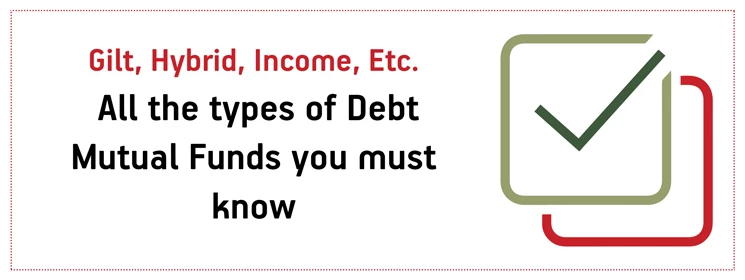-
Our Products
Our FundsFocus Funds
-
Self Care
Self-ServiceFind InformationWays To TransactPartner Solutions
-
Downloads
- Learnings
- About Us
-
More
-
Shareholders
-
Shareholders
-
-
SIP Calculators
- Back
-
Shareholders

IMPORTANT ALERT ! Beware of Fake AMC App, Online Impersonation & Scam WhatsApp Groups.

Gilt, Hybrid, Income, Etc. - All the types of Debt Mutual Funds you must know

Aug 02, 2017
4 mins
3 Rating
Are you someone who believes that taking risks is not necessary to live well? And that you shouldn’t have to wait for good things to happen? Well, if you are, then Debt Based Mutual Funds are the ideal investment option for you.
If you want a refresher, here is the most brilliant way to understand Debt and Equity Based Mutual Funds.
Debt Mutual Funds invest in various kinds of fixed income securities such as money market instruments, corporate bonds and government bonds etc. for different periods of time. If you are planning to invest in Debt Mutual Funds, it is crucial to keep in mind that there are several different types of Debt Mutual Funds. Here are a few points that can help you better understand how they work.
- Liquid Funds: These are a suitable low-risk option if you are looking to invest your excess cash for a short term. In liquid Funds, the fund managers invest in highly liquid money market securities (i.e. those that can be converted to cash easily) with a short-term outlook of up to 91 days.
- Ultra-Short- Term Funds: Looking to get good returns without a long lock-in period? Ultra- Short term funds with up to a 12-month tenure may just be right for you.
- Short-Term Funds: Again these have very low risk and are suitable for investors who are looking to invest for only between 1- 3 years.
- Dynamic Bond Funds: While these are considered a little bit riskier there is also a potential to earn reasonable returns. In Dynamic Bond Funds the Fund managers actively manage the investments across different types of debt securities with different maturity periods.
- Income Funds: In Income funds the Fund managers generally invest in Corporate and Government bonds along with other money market instruments. These are primarily suitable for long-term investors. It is important to note that these are also exposed to and affected by interest rate fluctuations.
- Gilt Funds: In Gilt funds, the Fund Managers invest only in Government Bonds issued by the central and state governments and these are suitable for investors with a long-term investment time span. While the default rate is extremely low, potential investors must realise that they are affected by possible changes in interest rate.
- Fixed Maturity Plans: These are similar in structure to a fixed deposit from the investor’s perspective, as they tend to operate over fixed time spans. They provide their maximum benefit if invested into for a long period of time and can also provide indexation tax benefits.
- Hybrid Funds: These look to combine the benefits of the security that Debt Funds provide
with the potential for growth that riskier Equity funds provide. In a hybrid fund, the Fund
managers would invest a majority of the funds into debt and residual portion into equity
markets.
Must Read - What are Hybrid Funds?
In order to avail the tax benefits that are available to investors with Mutual Funds, it is crucial that they are held for a minimum of 3 years, except for equity oriented funds which are tax free after one year. Income from investment in debt securities held for less than three years is taxed at the applicable tax slab for the individual. Investments held for more than three years are taxed at a fixed rate of 20% after indexation.
Also Read - What is Debt Fund?
Debt funds have a potential to grow your wealth, and your fund manager is the person to help you gain from investing in them! So sit back and enjoy the 6 benefits of having someone smart and awesome handle your money.
Mutual fund investments are subject to market risks, read all scheme related documents carefully.
Similar Articles





 1800-270-7000
1800-270-7000









.jpg?h=403&w=725&la=en&hash=9D8A3BE92C1D1DBB8CD7227660A9ECDF)